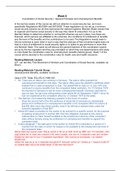Antwoorden
Tutorial 6 European Labour Law and Social Security Law
This document contains all the notes I took during the 6th tutorial. I would highly recommend using this document, because it will help you write your assignment. This document contains all the information you need to pass the assignments and exam. I passed the assignments and scored an 8 on the te...
[Meer zien]




